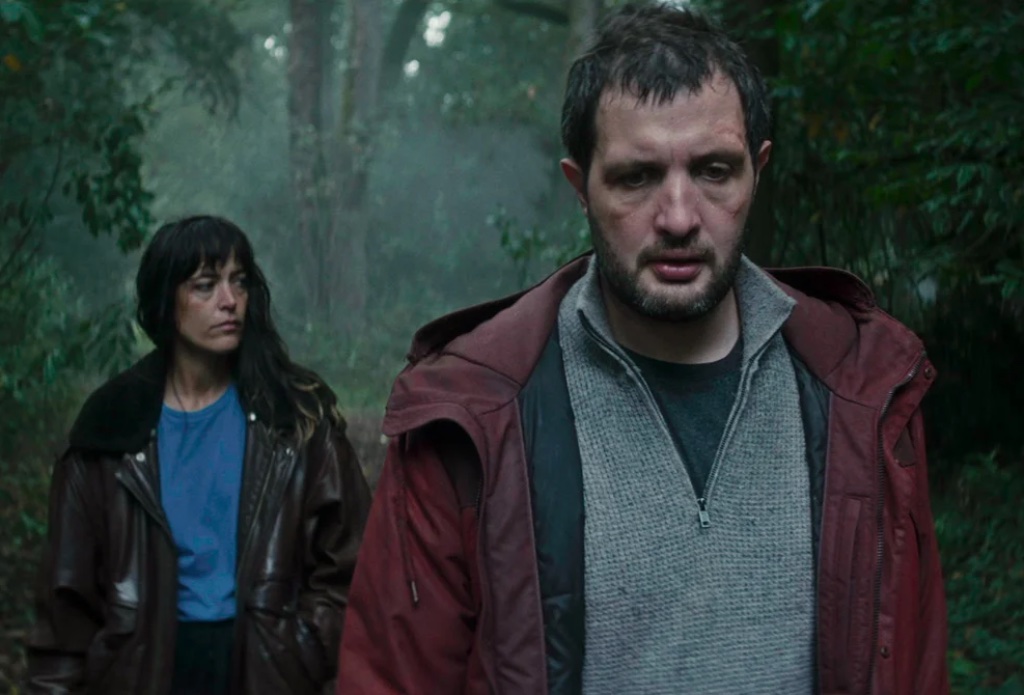It’s not all that unusual to find allegory lurking in current cinema and in media in general, especially in horror – one message hidden behind another, symbols that face one direction while pointing toward another, political dog-whistling in all its vile forms – but a new film, Vincent Doit Mourir (Vincent Must Die), provides a striking example, precisely because it is next to impossible to identity what exactly that other meaning might be.
The film’s director, Stéphan Castang, has said that he doesn’t like to be too overtly political in his filmmaking but that he does very much like to mix genres. That he certainly does in Vincent, moving from a straightforward workplace comedy, shot mostly in tight framing, to a middle section that more closely resembles a chase epic – with middle-aged Vincent the prey – and a finale in which violence has broadened into whole-scale destruction, and the film veers toward the dystopic.
In other words, we move from the everyday life of a vaguely autistic graphic artist who is gratuitously attacked by a couple of his fellow workers (who then profess no memory of the event) to a horror narrative in which the violence is potentially everywhere, ready to explode, and then a final section in which the world is saturated with blood and terror.
At first, we think that Vincent himself must be responsible for inciting this violence whenever anyone catches his eye: after the coworkers, some children in his building, an older woman whose car sidles up to his at a stoplight and finally crowds that are ready to rip him to shreds. Along the way, he hooks up with a young woman who also feels like a victim—poor, misunderstood, and prey to violent men—but who is herself not immune to the virus of hate that afflicts all who see Vincent.
The actor Karim Leklou brilliantly conveys Vincent’s confusion, terror and ultimate conviction that the only solution is to escape, to go off the grid. He first imagines that he has caught a virus that instantly infects anyone who encounters his glance, but he learns through a chance meeting with a homeless former professor that he is now one of the marked men, the unspecified victims who incite violence in others, which then spreads like wildfire, leading to mayhem and terror.
We could probably all provide some hypotheses for what might lie behind this allegory of anger and acting out – climate fury, political lies, racist convictions, provocations in the name of hate, etc. – but Castang insists that “the violence is always gratuitous” and needs no explanation. I, however, am only too aware of René Girard’s theory of the scapegoat and his assertion that societal breakdown can only be resolved through the conviction and murder of an anodyne, and probably innocent, victim, on whose back an imaginary crime can be pinned and whose murder will bring with it a return to social calm.
Should things go wrong with this scheme, however, the entire social organization collapses, and wholesale, gratuitous slaughter ensues. Castang’s film veers toward this same paranoid conclusion but is oddly saved by a flair for comedy (Castang likens Vincent to Buster Keaton conducting a train that has lost its controls) and occasionally its own unintentional flaws.
The film is never less than thought-provoking, and I can certainly recommend it, but I kept wondering throughout why some individuals manage to evade the curse of spontaneous violence, which occasionally pulled me out of the narrative, or why Victor and those like him, whose eyes incite all that mayhem, don’t just wear sunglasses! Such thoughts must have spared me the existential funk that might otherwise have ruined my evening.
That is not to say that I was unaffected: sitting in the metro car on the way home reading a philosophy book, I suddenly glimpsed the face of a vulnerable-looking young man looking up at me from below the book. I jumped 10 feet into the air, stricken by the apparition, terrifying the young man, who was crouched at my feet in the crowded aisle, in the process. “Jeez,” he exclaimed, as he backed into the crowd, ‘I only wanted to know who Hannah Arendt is!” I apologized and was trying to explain as he backed toward the exit and leapt to the platform.
In the immortal words of Stephen Stills: “Paranoia strikes deep. Into your life it will creep…”
Favorite
